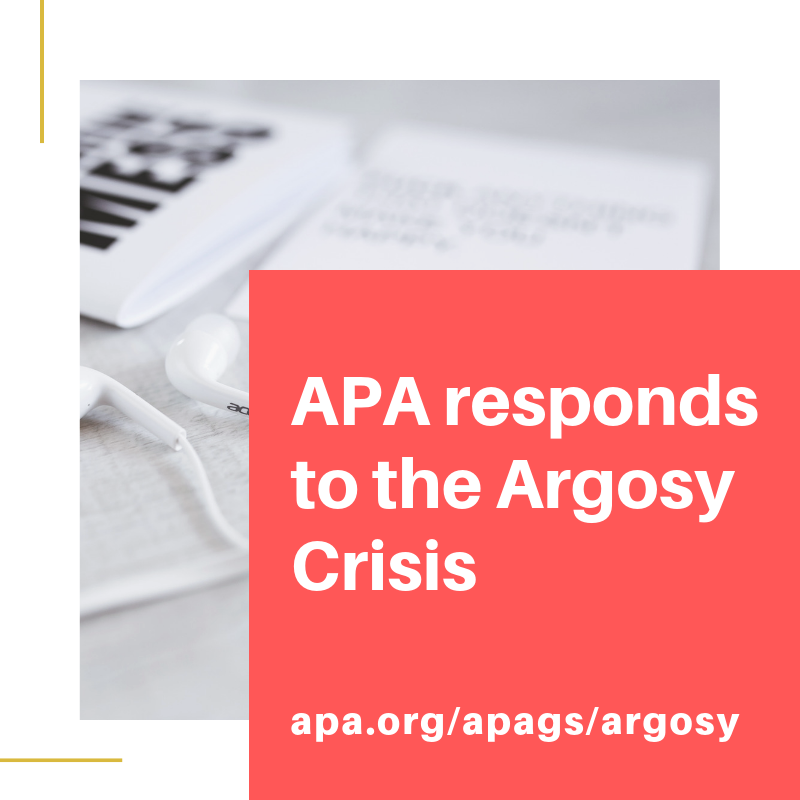Updated 4/29/20: Here’s a roundup of APA resources for students. We will update this list regularly. Also, be sure to check the APA website weekly for updates and new resources.
Continue readingAuthor Archives: Heather Dade

What Will Internship Sites Say About My Medical Marijuana?
Recently, we received this question in our APAGS inbox:
“As a psychology doctoral student, I am about to apply for internships. I take prescribed medical marijuana for a health condition. How do I approach the issue of drug testing as part of pre-internship employment screening?”
What a good question. I reached out to Dr. Jeff Baker, the head of the Association of Psychological Postdoctoral and Internship Centers, for his opinion on the matter. Dr. Baker kindly replied, giving his own personal thoughts on the matter (not those of APPIC’s) as formed by his years as a training director. He said this issue has come up a few times before, and it’s not as simple as drawing a line around states where it is legal. He writes, “There are many sites in Colorado and California, where THC is legal, that will not allow a positive drug screen for it. I’m not positive the rationale is universal, but a few programs have stated, ‘Alcohol is legal, but we do not allow trainees to have it in their system.'”
Dr. Baker’s advice continues —
“1. If a site does not allow medical marijuana, hopefully it says that in public materials (especially in states where that is allowed). The site should have some statement saying it requires THC (drug) screenings so the applicant can decide what sites might be eligible or ineligible.
2. If this information isn’t public, I would check with the site’s Human Resources department, hopefully anonymously and discreetly, prior to submitting an application. Some will have a policy, and some will not. This is not to be sneaky, but it is to remove any possibility that they would track your application. PS: Don’t call from your cellphone with caller ID. I don’t think most sites would go to this trouble to find out who called, but it doesn’t hurt to be cautious.
3. When checking with anyone at the program, I would advise applicants to be very clear about having a medical condition (do not give the name and disclose only what is necessary); that they have been prescribed THC; and that THC has been helpful for them to manage their medical condition which has been approved by a licensed health care provider.
4. I would advise them to apply to those sites that say it is not a problem but carefully read their public materials about drug screens.
5. I would advise them to be cautious about those that do not know their policy or clearly state that medical THC would be counted as a positive drug screen and is not allowed at this site. If they do NOT review the public/HR policy about prescribed THC and match to a site, then they find out that medical marijuana is not allowed, they have wasted a lot of time.
6. I do NOT advise applicants to consult with the program or training director directly about the issue. I fear that will likely increase the chances that site will decline to interview that person. They will be taking a chance by disclosing it. This is NOT true for the vast majority of training directors but there is no need to disclose identifying information prior to submitting an application.”
With any luck, prospective sites will see you, dear reader, as an asset all around. Thank you for being so responsible and proactive with treatment and contacting APAGS with your question.
Increasing Research Transparency in Psychological Science: How Can Graduate Students Participate?
Written by: Michelle Rivers, Rachael Soicher, and Dr. Morton Ann Gernsbacher
- What is transparency in research, and why does it matter?
Research transparency, also referred to as “open science,” is the process of making research and its dissemination accessible to all levels of society. Practices that increase research transparency accelerate progress toward solving the persistent problems of society. For example, you may have heard about the “replication crisis” in psychology and other sciences. Engaging in open science practices can help make science more reproducible and thus more trustworthy.
As the field of psychology works toward greater research transparency, how can you get involved? In this post, we talk about some baby steps you can take as a graduate student, and we address some common challenges you may face along the way.
2. How can you get started?
Below we’ve crafted a short list of ways you can make your research more transparent. Think of baby steps. Don’t feel like you have to do all of them at once!
- Pre-register your study design, hypotheses, and planned analyses. Place them in a locked file (hardcopy or electronically) or post them on free websites like AsPredicted or Open Science Framework.
- Make your study materials, data, preprints, and post-prints publicly available online, such as on your lab’s website or on Open Science Framework.
- Avoid “Questionable Research Practices,” such as selectively reporting dependent measures/entire experiments, revising your sample size after viewing your data, or so-called “HARKing” (hypothesizing after the results are known).
- Take advantage of research collaborations. Do you have or need access to a particular demographic sample? Check out StudySwap or Psychological Science Accelerator, online platforms for research replication, collaboration, and resource exchanges.
- Use free and open-source software so it’s easier for others to reproduce your exact methods and analyses. For example, OpenSesame and PsychoPy are open-source applications for running psychology experiments, LimeSurvey is open-source survey software, G*Power is free software for running power analyses, and R is free software for statistical computing and graphics
- Practice disseminating your research to diverse audiences. For example, one of us, Michelle, manages a blog (cogbites.org) run by early-career academics that focuses on translating scientific research about the study of mental processes to a general audience. To learn more about science communication and outreach, consider applying to attend ComSciCon, a workshop for graduate students, by graduate students.
- Stay informed! If you have an advanced stats or methods course in your program, encourage the instructor to include recent readings on research transparency. One of us, Morton, teaches an open-access active-learning Research Methods course, and you can find other teaching resources here. Consider starting a reading group with other students in your program!
APAGS Charts its Next Five Years
It is with great excitement that I share the new 2019-2023 Strategic Plan for the American Psychological Association of Graduate Students. Over the past year, APAGS leaders have been working together to brainstorm, gather information, and articulate a five-year Strategic Plan to inform how APAGS can better serve graduate students around the nation and the world. Take a moment to read through the main pillars and objectives of the Strategic Plan that was unanimously approved by the APAGS Committee in December.
You may be aware that APA has also completed the development of its strategic plan. APAGS leaders anticipate that the APAGS strategic plan will align well with the larger APA plan.
Feel free to share your thoughts on the plan, as well as ideas you have about how APAGS can continue to use this living document to inform how we focus our time, utilize our resources, and support the next generation of psychology professionals.
APA Responds to the Argosy Crisis

As a surreal situation unfolds at Argosy University and its campuses around the country, APA desires to help as much as possible within our powers. We have been busy devoting considerable resources to impacted individuals and working with various stakeholders.
Late last night, our APA President and the Chair of our Council Leadership Team issued a joint statement that read in part: “Our principal charge is to protect students and the public by promoting consistent quality in the teaching of psychology…We are developing a nimble advocacy strategy…Moreover, we are in constant contact with relevant agencies and other affected accreditors, so that we stay apprised of the rapidly changing terrain…If Argosy closes, the next step will be to work with Argosy and any programs or institutions, arranging teach-out or transfer plans….APA is committed to continuing to do all within its scope as an accreditor to facilitate these transitions.”
We are keeping a new page updated regularly: www.apa.org/apags/argosy. It contains answers to a number of commons questions; instructs affected students on how to advocate; and provides some resources and links. One of these resources is the Psychology Student Action Center, which our APAGS staff set up to respond to people in real time to the extent we can keep pace. Please share the page with anyone who may need it.
It is important that members of the psychology community do all we can to recognize the significant ways that Argosy students and faculty have been affected by the actions and circumstances surrounding their education at Argosy University. Students and faculty are the innocent bystanders to what has been happening.
My hope is that the intensity of this situation will diminish quickly and that new paths may emerge soon.
–Eddy Ameen, PhD, Associate Executive Director of Early Career and Graduate Student Affairs at the American Psychological Association in Washington, DC.
